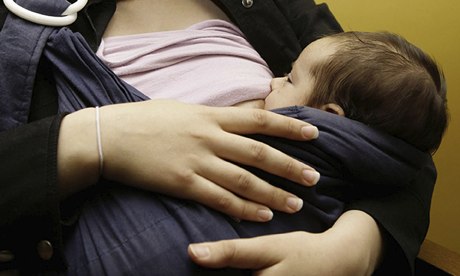
Women in low-income areas of the country where bottle-feeding is the norm are to be offered up to £200 in shopping vouchers if they breastfeed their baby, in an attempt to find out whether cultural barriers against breastfeeding can be overcome by a financial incentive.
The study, launched by Sheffield University, will involve 130 mothers in Yorkshire and Derbyshire, in communities where, the researchers say, breastfeeding is in effect stigmatised.
"A woman from a young, white low-income area will often tell you it is embarrassing to breastfeed in public or even in her own home. We know that is the community norm," said Mary Renfrew, professor of mother and infant health at Dundee University, who is advising the project.
"Women have even told us it is immoral because breasts have been very sexualised. They think they might be open to the gaze of people who think they are doing something wrong."
The project is likely to provoke hostility from some in communities where breastfeeding is more usual and also among those who have found it difficult, who may think offering vouchers is a form of bribery or coercion.
But Dr Clare Relton, leading the project, likened it to governments handing out milk tokens or the Healthy Start programme offering deprived families vouchers. "Not breastfeeding is a cause of inequality," she said.
"Mums and babies have better outcomes if they breastfeed. In parts of the UK infant formula feeding is the norm. Mums haven't been breastfed themselves and haven't seen anyone breastfeeding. The skills required have been lost in some communities."
Breastfeeding protects babies from gut problems, respiratory problems, ear infections and the life-threatening condition necrotising enterocolitis, according to a Unicef report last year on which Renfrew was the lead author. It also protects women from breast cancer. Yet the UK has a poor record on breastfeeding, with only 35% of mothers still doing it at all at six months, as the World Health Organisation recommends.
The study calculated that the NHS could save more than £40m a year if more women were helped to breastfeed for longer.
The pilot scheme will take place in areas where only around a quarter of women are breastfeeding their baby by six weeks, compared with over half nationally. Women will be offered vouchers worth £40 if they are breastfeeding when the baby is two days old and then further £40 vouchers at 10 days and at six weeks. The last two vouchers are spaced further apart – at three months and at six months.
The team acknowledges that verification could be an issue. They will ask the mother to sign a declaration that she is breastfeeding and then ask either the health visitor, midwife or breastfeeding counsellor to sign another stating they have discussed it.
Relton said the aim of the pilot was to find out whether the concept would work in real life. If it does, it could be refined before a national pilot scheme is attempted.
Susan Jebb, professor of diet and population health at Oxford University, called for the scheme to be given a chance.
"We know that breastfeeding has long-term benefits for the baby and most mothers in the UK have now heard the 'breast is best' message loud and clear. Yet despite years of health promotion breast feeding rates are still low and socially patterned," she said.
"Financial incentives have proved modestly effectively in changing some other health-related behaviours, but it is not clear whether this might enhance breast feeding rates, especially the maintenance of breast feeding."
If the pilot project did increase breastfeeding and was cost-effective, "we need a public conversation about whether this should be adopted into policy. It's important not to condone or condemn this until we have clear evidence of whether or not it may be effective," she said.
But the Royal College of Midwives had reservations. While it was not against financial incentives for the right reasons, "the motive for breastfeeding cannot be rooted by offering financial reward. It has to be something that a mother wants to do in the interest of the health and wellbeing of her child", said professional policy adviser Janet Fyle.
She agreed that there were "generations of women who may not have seen anyone breastfeeding their baby, meaning it is not the cultural norm in many communities". But, she said, the best way to tackle that was through investing in more midwives and improving antenatal and postnatal care.
The Royal College of Paediatrics and Child Health was also lukewarm. Professor Mitch Blair, officer for health promotion, said that "offering financial incentives proposed by this scheme, may not necessarily be the right way to go about it.
"It is more important that those mothers who wish to breastfeed are appropriately and fully supported to do so prior to, and following the birth and know the best techniques to feed their baby and keep themselves comfortable at the same time."
Rosemary Dodds, senior policy advisor of the National Childbirth Trust, said it was important women are not pressurised. Many women stop breastfeeding because they don't get the information and the support they need, she said.
"Four out of five women who stop in the first six weeks would have liked to continue for longer. This is why NCT offers breastfeeding services such as baby cafes, peer supporters and run a helpline with breastfeeding counsellors - all provide information and support for women and their families."

